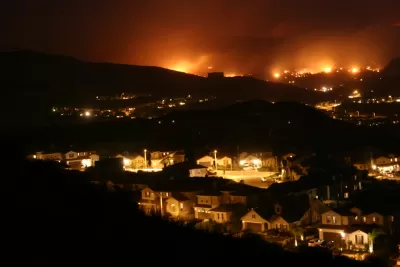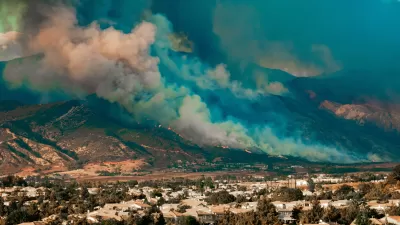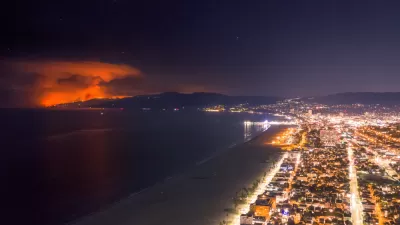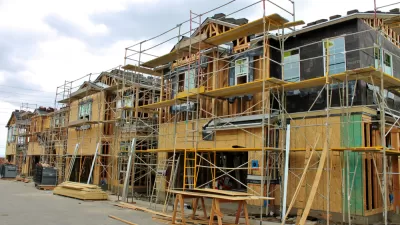The decision could signal a new reluctance to allow development in wildland areas at high risk for fires.

Despite the destruction caused by increasingly large and long-lasting wildfires in California in recent years, writes Thomas Elias, "development continued virtually unabated" in the state's wildland-urban interface. "Until early this year, when a judge in sparsely populated Lake County said 'No!' to a 16,000-acre luxury mixed-use project on land partly singed by past fires and partly deemed likely to flare up in future ones."
As Elias reports, "The judge ruled in a lawsuit brought by state Atty. Gen. Rob Bonta and several environmental groups claiming the project could prove disastrous to both its own future residents and guests but also to present area residents." Explaining his ruling, Lake County Superior Court Judge J. David Markham said that "the development could close off or overcrowd fire evacuation routes, dooming many to death, as happened during the 2018 Camp Fire in Butte County."
Elias criticizes state legislation that eliminates single-family zoning and permits increased density without requiring developers or property owners to build additional infrastructure to support extra housing units. Elias writes that infill development, and potentially the conversion of office buildings vacated during the pandemic into housing, should take priority over new development that puts communities at risk for natural disasters.
FULL STORY: As California continues to burn, finally a pushback against wildland development

Manufactured Crisis: Losing the Nation’s Largest Source of Unsubsidized Affordable Housing
Manufactured housing communities have long been an affordable housing option for millions of people living in the U.S., but that affordability is disappearing rapidly. How did we get here?

Americans May Be Stuck — But Why?
Americans are moving a lot less than they once did, and that is a problem. While Yoni Applebaum, in his highly-publicized article Stuck, gets the reasons badly wrong, it's still important to ask: why are we moving so much less than before?

Using Old Oil and Gas Wells for Green Energy Storage
Penn State researchers have found that repurposing abandoned oil and gas wells for geothermal-assisted compressed-air energy storage can boost efficiency, reduce environmental risks, and support clean energy and job transitions.

Minneapolis Bans Rent-Setting Software
Four cities have enacted restrictions on algorithmic software that can inflate rent costs.

Oakland to Add 244 New EV Chargers
Oakland plans to launch its new charging network at eight locations by the end of 2025.

Jane Goodall Inspires with Message of Hope, Resilience, and Environmental Action
Speaking in Pasadena, Jane Goodall offered a hopeful and inspirational message, urging global compassion, environmental responsibility, and the power of individual action to shape a better future.
Urban Design for Planners 1: Software Tools
This six-course series explores essential urban design concepts using open source software and equips planners with the tools they need to participate fully in the urban design process.
Planning for Universal Design
Learn the tools for implementing Universal Design in planning regulations.
Heyer Gruel & Associates PA
City of Moreno Valley
Institute for Housing and Urban Development Studies (IHS)
City of Grandview
Harvard GSD Executive Education
Salt Lake City
NYU Wagner Graduate School of Public Service
City of Cambridge, Maryland





























